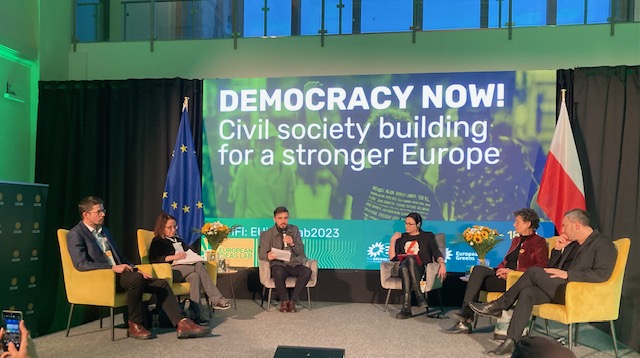
Legacy Strategy Summit returns for 2023 with EFA discount
March 28, 2023
Paper: Fundraisers can help donors create more value from their support
April 5, 2023Activists, civil society representatives and policymakers from across Europe came together in March, to discuss challenges faced by civil society today and the proposals for a European association statute.
The European Ideas Lab (EIL) session, titled ‘Democracy Now! Civil society building for a stronger Europe’, took place in Warsaw on 3-4 March. EIL is an annual event hosted by The Greens/EFA parliamentary group to find creative solutions to problems.
While the trend in some European countries has been to shrink the civic space through actions including limiting access to public funds or preventing peaceful assemblies, moves are also afoot to transform and protect civic space.
However, the differing legislations that exist across Europe to regulate the NGO sector is a key issue that limits the development of a European civic space. As Francesca Fanucci from ECNL pointed out during the session: “Despite the growing number of NPOs operating across EU Member states, there is currently no harmonised pan-European legislative framework allowing them to operate and organise themselves properly at cross-border level.”

Therefore, implementing a European association statute and minimum standards for member states on how to treat associations and NPOs could help to protect and strengthen civil society organisations throughout the EU.
Member states’ differing understanding of civil society requires evaluation during the development process of a European association statute, with the panel unanimous that the definitions of public benefit organisations should be clear for all, and mutually recognised. Lack of harmonisation is critical in cases, for example, when an NGO wants to move from one EU country to another and finds out not only that its legal form does not exist in that country, but that it cannot even simply convert its current form into an equivalent one. This can result in having to shut down and create a new organisation with all the consequences that this entails in terms of administrative costs, restrictions on access to funding, etc.
NGOs are economic entities like companies, and ought to have same rights to decide their location and to work across borders, the panel agreed. Even though there would be some common basic rules, the state’s sovereignty to decide on rules and laws on areas such as taxation would not be questioned.
The panel also discussed the participation of NGOs in the regulation process. Where there have been consultations on a national level, they are often not public but inclusive only of selected parties. As a result, NGOs have felt that they are not improving anything but fighting against moves and proposals. This led to a question in the audience: Are NGOs perceived as government enemies?
Main photo by Iwona Castiello d’Antonio on Unsplash




